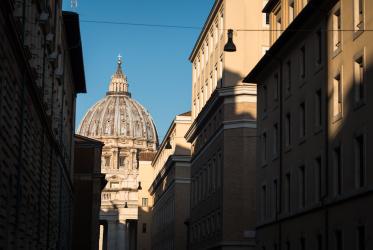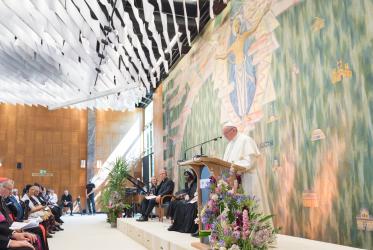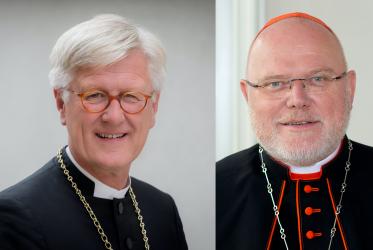On 17-19 November 2005, 28 participants, invited by the World Council of Churches and by the Pontifical Council for Promoting Christian Unity, gathered at the Ecumenical Institute of Bossey, Switzerland, the site of the first Joint Working Group meeting in 1965. The purpose of the meeting was to mark the 40th anniversary of the Joint Working Group at a transitional moment in the ecumenical movement. The consultation reflected on the role and mandate of the Joint Working Group and the ways in which the Group could continue to strengthen the relationship between the World Council of Churches and the Roman Catholic Church.
The meeting was preceded by an open dialogue on spirituality and a public celebration of the 40th anniversary at the World Council of Churches' Ecumenical Centre in Geneva. Presentations on the future of ecumenism were given by His Holiness Aram I and His Eminence Cardinal Walter Kasper, followed by an ecumenical evening prayer.
The purpose of the Joint Working Group is to enhance the relationships between the World Council of Churches and the Roman Catholic Church. The goals of the consultation were as follows: to assess the achievements of the Joint Working Group and its impact on relations between the parent bodies, to explore the role and contribution of the Working Group to the renewal of ecumenism in the 21st century, to help the parent bodies express their common commitment to the one ecumenical movement, to reevaluate the methodology of its work as a group, to identify ways in which the experience and findings of the Joint Working Group could better reach the local churches, and to suggest new forms of working together.
Through intense dialogue, the consultation addressed many aspects of the Joint Working Group experience, seeking to offer to the next Joint Working Group reflections that might help to improve its working method and effectiveness. The consultation affirmed the Eighth Report of the Joint Working Group between the Roman Catholic Church and the World Council of Churches and its recommendations. A more detailed account of the proceedings of the consultation will be found in the Minutes.
The very fact of the establishment and continued co-operation between the Roman Catholic Church and the World Council of Churches for 40 years must be considered one of the significant achievements of the modern ecumenical movement. The slow but persevering establishment of a relationship in which the World Council of Churches and the Catholic Church have found in one another a trusted partner has been perhaps the most enduring achievement of the past four decades. Some examples of concrete co-operation include joint responsibility for preparing the Week of Prayer for Christian Unity, full membership in the commissions on Faith and Order, Mission and Evangelism, co-operation with other World Council of Churches entities, provision for staff in areas of mission and at the Bossey Ecumenical Institute, joint study projects on topics such as baptism and theological anthropology, and providing oversight and review of institutional links between the World Council of Churches and the Roman Catholic Church.
The decree Unitatis Redintegratio of the Second Vatican Council noted that the call to full visible Christian unity can be fulfilled only by the joint efforts of churches working together. The Joint Working Group has sought to play this role over the years, as well as that of calling the churches to recover and reaffirm the original vision and goal of the ecumenical movement. In this context, examination of the relationship between bilateral and multilateral expressions of the ecumenical movement needs to be undertaken, in order to affirm the legitimacy of both types of relations and to clarify that multilateral dialogue provides the framework within which bilateral relations grow.
The task of the Joint Working Group has been one of providing a common witness to the enduring commitment of the two parent bodies to cooperate in pursuing a common ecumenical vision. The Working Group, which was originally intended to be provisional, may not be the only possible alternative to membership of the Roman Catholic Church in the World Council of Churches, but in the historical reality since the Second Vatican Council, it has proved to be an effective expression of the desire of both parties for an ongoing collaboration and partnership.
The forthcoming Joint Working Group must study the possibilities of new forms of working together to assess and respond to the continually evolving global and ecclesial context. The Joint Working Group will need to pay close attention to actual developments in the ecumenical movement, e.g., the Global Christian Forum as it evolves and takes shape, the Conference of the Secretaries of Christian World Communions as it seeks to redefine its role, and the emerging process of reconfiguration of the ecumenical movement as it attempts to articulate a common vision and to review existing structures. Stocktaking of the state of ecumenical relations, identifying strengths and weaknesses in actual ecumenical relations, setting priorities with measurable goals, and monitoring progress to determine whether goals have been seriously and consistently pursued should all become part of the expected activity of the Joint Working Group.
In an evaluation of the methodology of the Joint Working Group, the exchange of information, the identification of initiatives and encouragement of the parent bodies were seen as central to the task of the Joint Working Group. It was felt that the Joint Working Group should not duplicate the work of the Faith and Order Commission in producing studies on doctrinal questions. On the other hand, the Joint Working Group has a role to play in providing reflection on the pastoral dimension, and must decide whether it can make a particular contribution in a given area (cf. Eighth Report, p. 29) either by asking a specialized body to undertake a study or by itself organizing a study on its own. This method may continue to be fruitful, because the Joint Working Group has an enabling function for the parent bodies.
Areas of concern for the Joint Working Group have been the communication of the results of its studies, deliberations, and declarations to the parent bodies, the reception of its reports, and the implementation of its recommendations. This consultation recognizes the need for improvement in two-way communication between the Joint Working Group and its parent bodies in order to ensure that its mandate is effectively fulfilled. More attention must be given to exploring effective ways of fostering reception of ecumenical agreements within the Roman Catholic Church and among the member churches of the World Council of Churches. As for implementation, the style of communication should be that of advocacy aimed at enabling the churches to receive, apprehend and affirm the material communicated. A change of name for the Group may be considered as a means of expressing the significance of this partnership.
Experience from past years indicates that any future Joint Working Group should spend some time, particularly at the beginning of its mandate, in familiarizing itself with the structures of the parent bodies and building a sense of teamwork and of shared spiritual commitment. Time spent on setting priorities for its work together would help the Joint Working Group focus on its ecumenical mission. In this way, the working group will be better prepared to incarnate ecumenism in its meetings and provide a common witness to a single ecumenical vision.
Rome, Geneva 21 November 2005



